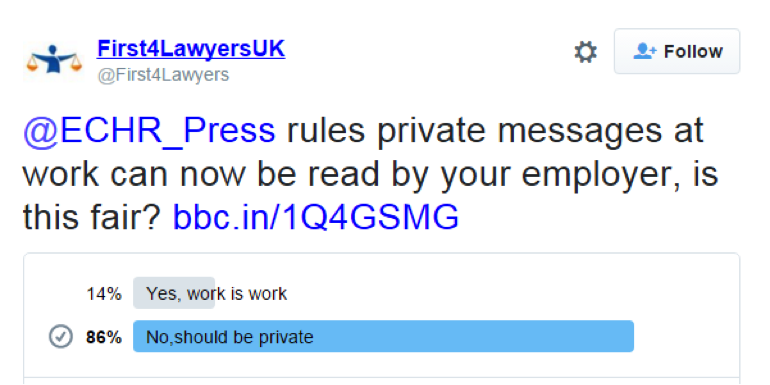Instant messaging platforms like these are commonly used as a way to improve office communication. However, many are using the platforms to not only converse with other colleagues for work matters but to also interact socially too.
The new EU ruling has been dubbed the ‘snoopers’ charter for employers’, and perhaps rightly so.
More and more people are being given work phones and laptops as part of their employment offer and a result of this many in fact use these for personal use too. However, it is these situations which are causing confusion – does my employer still have the right to surveil?
The simple answer is yes! Although the law only allows employers to monitor conversations on company phones and devices; if they believe your personal social networking tools such as WhatsApp may contain professional messages, they have a legal right to read them and the court WILL rule the surveillance legitimate.
The case originated in Romania back in 2007 when an engineer claimed that his right to a private life had been breached when his employers accessed his private messages and read his conversations which led to an instant dismissal.
Because of this, many are fearful of the repercussions, confused over their rights, and protective over their personal information and conversations so much that the EU ruling has caused a social stir.
First4lawyers conducted a quick poll, asking the people of Twitter whether they agree with the law and think it is fair or whether it is unjust. A large 86% of respondents said that the new ruling was unfair and that private messages should remain private! However, 14% disagreed arguing that at work your time is your employer’s. Do you agree?

Andy Cullwick at First4lawyers states: “Employers need to check they have the right processes and policies in place so that it is clear to employees where they stand, and therefore employees do not fear being monitored unreasonably by their bosses.
“If it is clear what your company considers acceptable in terms of using work devices, there will be no ambiguity between employers and employees, and therefore there should be nothing to be fearful of”.
From an employer’s perspective, the number of people who believe that ‘work is work’, and that private messages should not be sent during work hours (whether on a company or personal device) is surprisingly low.
Andy Cullwick says: “The case in Romania has demonstrated the practicality of the law, as the company displayed how the worker had neglected his duties as a result of personal phone usage. Whilst employees are likely to see it as an imposition on their rights, employers are more likely to view the practicalities of the law; perhaps that is where the difference in our poll originated.
“This is potentially a landmark change in legislation, which will be tested over time to establish the boundaries between private and public messaging on company devices.
“Until we start seeing cases, it is a very subjective approach as to where the lines and boundaries are drawn. An employee using the property of their employer should be mindful”
You can find out more about your rights as an employee here or get in touch at http://www.first4lawyers.com/contact-us/






